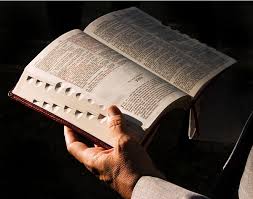PARTICULAR OBJECTIONS |
Genealogy in Matthew |
| 14 names instead of 18, and in saying that there were only fourteen generations.Matthew has omitted three kings, but this does not prove he made a mistake in doing so. The point he is showing is Christ’s legal connection with the throne of David. The term “begat” is employed in Hebrew for a descendant. Matthew left out three kings, the children of an apostate woman, recommencing with him in whose reign the prophecies of Messiah dawned brightly on Israel, and he has counted his genealogies correctly.Inconsistency in names e.g. Ahaziah and UzziahLittle problem when looking at the Hebrew and its transliteration into Greek.Was Jesus the biological son of Joseph?The legal descent is evident. Matthew does not for a moment leave a cloud on the fact that Jesus was not Joseph’s son. He says, “The husband of Mary, of whom was born Jesus, who is called Christ.” He is not giving the natural descent, and Christ’s miraculous birth follows. Different genealogy in Luke
Luke gives that of Mary. If Mary had no brother and was the daughter of Eli, the Lord was descended from Eli; and Joseph would be called τοῦ Ηλὶ (tou Eli) as heir and representative of Eli. |
| Alleged Mistakes in Acts 7:16 |
| Click above for original |
| Discourse of Gamaliel, Acts 5 |
| Click above for original |
The Slaughter of the Infants |
| This event is not recorded by Jewish historian, Josephus.It is hardly likely that a Jewish infidel historian should have recorded a particular act of local cruelty, which would have been the strongest testimony possible that Jesus was the Messiah. Indeed the omission of one local cruelty in a village is nothing extraordinary. The killing a few children was nothing to the hard-heartedness of Josephus and Herod, if there was no particular reason. If there was, it was the last thing Josephus would mention. |
| Zacharias, Son of Barachias |
| Click above for original |
Names of the Apostles |
| Different names in different listsSome had two names, very common among the Jews. Levi had also the name of Matthew, as Saul had that of Paul, Simon that of Peter. Thaddaeus, Lebbaeus and Judas (not Iscariot) would appear to be the same person. |
| Harmonizing the Gospels |
| Click above for original |
| The Rivers in Paradise |
| Click above for original |
The Sentence on the Serpent: Serpent Worship |
| The sentence of the serpent is just a fableGoing on its belly and eating dust (Gen 3:15) shows the complete humiliation of the serpent. In its fullest extent it is a symbol of death. The whole thing is scorned but it gives the source, explanation and judgment of what has characterised the human race, everywhere and at all time. Man has worshipped the serpent, perhaps more than anything else, with the possible exception of the Sun in Greece and Rome. Ophiolatry, or serpent worship, is found in China, Egypt, Babylon, England (Stonehenge), Ireland, France, North and South America, Russia, Scandinavia, India and Africa. People kept serpents as household gods, wore ornaments as talismans, and tattooed images of the serpent and the sun on their skin. It is often portrayed erect, being fed with sweet cakes, with a naked woman as priestess in attendance. The Hivites who were driven out of Palestine by Joshua were serpent worshippers. Scripture presents that old serpent as the one who elevated himself as god of all the world. Yet the serpent is a venomous prostrate reptile. So when we see the whole world of these traditions of the serpent, of the worship of the serpent (erect), a sober mind must deduce the immense moral importance of this phenomenon, as exposing, the terrible and real secret of it all – the ruined condition of rebellious and disobedient man. Scripture has not invented these facts.Also, the notion of gaining wisdom from serpents is universal. Satan seized upon the idea of God in men’s minds, and, where possible has connected man’s obscure traditions with himself. The sun is seen as the benefactor; the serpent the one giving intelligence, and both became associated with the idea of the unity of deity and the universe. Moreover, in Egypt above the serpent-worshipping temple of Isis there were the words ‘I am all that hath been, and is, and shall be; and my veil no mortal hath ever removed’. All wisdom was purported to be there.Sometimes the worship of the sun drove out serpent worship, yet it was always remained connected with it. Apollo (the sun), established his worship at Delphi by slaying Typhon, an immense serpent, who was also said to have been cast down from heaven by Jupiter. He then gave oracles in his place, Delphi. Scandinavian mythology is similar, the great serpent being Loke. Hercules, Thor and Krishna kill serpents. (or dragons). It would appear that idolatry came in after the flood. There is a vague tradition of a reign of bliss under Saturn, his three sons, Jupiter, Neptune, and Pluto, becoming the supreme gods of heaven, earth, and sea. In some way these correspond to Shem, Ham and Japeth. They carried a statue about in a kind of ship. Indeed they used the same word for ‘temple’ and ‘ship’. There is the pain of childbirth, a pain borne by the woman, the man being exempt. But faith can lay hold of the real meaning of the statement that the woman’s seed will crush the head of the serpent. |
| Two Accounts of the Creation |
| Click above for original |
| Opinion of Dr. Arnold of Rugby |
| Click above for original |
| Joseph |
| Click above for original |
The Longevity of the Patriarchs |
| Objection: the longevity of the patriarchs is unrealistic.Answer: It is a question of the sovereign power of God, it is absurd to argue otherwise. Men can live 969 years like Methuselah, or 500, or 200 or 70. But the reduction coincides with idolatry and the worship of man. |
| The Ark |
| Click above for original |
| Infallibility |
| Objection: You cannot say that anything is infallible.Answer: God alone is infallible; for “infallible” means one who cannot fail. Truth is not the same as infallibility; truth is the opposite to error, not to fallibility.
Scripture comes from God; it presents the truth; it is infallible. But there is no need to defend it to the infidel who rejects it. However, There is a difference between infallibility and perfect truth. If I question the infallibility of scripture, I am making a statement about the book. However when I reject perfect truth, I avoid facing what affects my conscience. In strict logic, only one who is incapable of erring, is infallible in what he says, |
| The Entrance of Death |
| Click above for original |
| The Fall |
| Click above for original |
| Objections dependent on “Science” |
| Although JND used the word ‘science’, this objection surrounds more the anthropological background to beliefs worldwide.
It is not related to technological developments about which JND could not have known. These are however irrelevant to this discussion. I do not believe anything of the bible has been disproved by the discoveries of the past 150 years. Objection – The biblical account is inconsistent with modern knowledge. Answer. There is no inconsistency. As regards man, the science of physiology can only examine man as he is — in a state of mortality. This is not, according to scripture how God created him. To suppose that God could not have sustained man in an immortal condition, is to put limitations on God, who cannot be limited. We are taught that following the fall, man became a dying creature, subject to ‘wear and tear’. If we look into ancient texts we find various references consistent with the account in Genesis. For example Plato wrote, ‘They lived naked in a state of happiness, and had an abundance of fruits, which were produced without the labour of agriculture, and men and beasts could then converse together. But these things we must pass over, until there appear some one to interpret them to us.’ [I cannot locate Source – maybe the Republic]. Fragments of truth, amidst the mass of superstition, exist in Egyptian, Greek, Mexican and Hindu fables. However, none of the written accounts are older than about 700BC [National Geographic refers to Mycenaean writing around 1450BC, the time of the exodus, but that makes no difference]. The millions of years of Hindu chronology, or the more moderate thousands of Chinese dynasties, have disappeared before increased information. Indeed, we have some Chinese dynasties and some dark Hindu traditions, which tend to confirm the early Mosaic accounts. God, however, has given us a concise, simple account of immense moral import, infinitely elevated above the whole range of the heathen fables which pervert its elements, placing the supreme God — man — good — evil — responsibility — grace — law — promise — the creatures — marriage, all in their place. The Mosaic account brings out the innocence at creation, the knowledge of good and evil, conscience, judgment, the closing of the way to the tree of life, and the promise in the woman’s seed. In so many fables there is the conflict between good and evil, with good prevailing. However in scripture, the drama was a reality; all involving one man and his failing companion. Yet from her who failed recovery was to spring; grace was to be brought out and magnified. Another thing is evident, that Mesopotamia, and the country north of it, is the area from which the world was peopled. Assyria, Babylon, and Egypt, Persia, Greece, Rome, all are grouped round it. Indeed the Phoenicians even went to Ireland. [Skeptics might argue nowadays that early man came from Africa, but this is not the subject here]. No creature can subsist per se, that is, independently of God. |
The Song of Deborah |
| Objection: The prophetess Deborah, in an inspired psalm, pronounces Jael to be blessed above women, and glorifies her act by an elaborate description of its atrocities.Answer: Scripture is inspired by God. God gives His mind on any particular subject to anyone spiritually capable of understanding it.However, just because scripture provides a record of peoples’ words, that does not mean that what they said was inspired. We have Satan’s words, wicked men’s words, and human accounts of various facts, recorded by inspiration, but not themselves inspired. Scripture gives us a picture of what man, and particularly Israel, is. It does it, not just by dogmatic statements, but by giving us a historical development of what man has does and felt in various circumstances. If the Bible had merely given us God’s judgment, we never should have had the testimony to our consciences that we have. Scripture affords us man’s actual history under the various dispensations of God. We get an inspired testimony of what God’s mind is, adapted in grace to our consciences. A gracious father speaks to his child according to what suits the child, yet always in a way worthy of himself. That is how God has dealt with Israel and all men. How else could He have done so?In the Old Testament we have a perfect, divinely-given picture of man, in various relationships with a gracious God. His whole condition is brought out, so that by a divinely given history, we might know ourselves, and at the same time appreciate the whole course of God’s dealings with man. Ultimately, in perfection God Himself is manifested in Christ in supreme grace. Man and God get into a relationship according to the security of His nature, and the perfectness of His love. When we were yet without strength, in due time Christ died for the ungodly. (Rom. 5:6).We should not have the knowledge either of man or God, and His wondrous, perfect and patient ways, if we had not seen men presented at exactly as they were. A statement of morality by God would, no doubt, have shown what man ought to be. We have that in the law. But that would not have shown us what man is.
People who were used to communicate things, such as Deborah, were pious and animated in their hearts by God’s Spirit. In their dispensations, they were just not as instructed, as we have been in ours. Deborah’s song is not a communication of God’s thoughts, but of Deborah’s feelings. Doubtless, her heart was moved by the Spirit in thankfulness for the deliverance of God’s beloved people, but there is no sign of its being a communication from God to His people. It was consistent with the light she possessed, and coloured by the general condition of the people. Like Hannah, she appreciates God Himself known in mercy to His people. The song does not rise above the measure of Israel’s blessing. Things were to be extended under David, Solomon and the prophets. The Old Testament is a spiritual instruction for us, so that we can know God, and His perfect ways, more fully. I may know some scientific facts, and rely on these but I have the perfection of Christ to judge by. To use the Word rightly depends on my spiritual progress and moral state. This is exactly as it ought to be. We are tempted to judge things from the standpoint of a clearer revelation. I may pass a moral judgment on many things in the Old Testament, because God has given me the true light, and the darkness is now passed. He who is light, has given me the light to judge these things. Christ has given the perfect key by which to judge of it all |
The Sacrifice of Isaac |
| Objection: Abraham’s preparedness to sacrifice Isaac makes him no different from idolaters of the worst kind – practicing human sacrifice.Answer: Abraham’s sacrificial act is not presented as a rule of morality nor of conduct in any way, but as a special case in which Abraham’s faith was put to the test. There is no kind of analogy with “those who sacrificed their children to Moloch.”* Jer. 32:35. In their horrid barbarity, they sought to assuage their consciences to placate their vengeful god.In Abraham’s case it was different. God had placed the promises in Isaac. Abraham was now tested, to show that he had such confidence in God, that he would give up all the promises as possessed and obey God implicitly, whatever the cost. When this was proved, God would not suffer Isaac to be touched.According to Hebrews 11 Abraham believed that God would somehow raise up Isaac again, in order to accomplish His promises. |
| Mr. Newman’s Notions of Inspiration |
| Click above for original |
The Flood |
Objection: Where did the waters of the flood come from?Answer: It is argued that the water in the deluge came from the clouds, and perhaps from the sea. These are, of course, the same – one cycle. Scripture uses language that is unique to this event – “all the fountains of the great deep were broken up, and the windows of heaven were opened”. (Gen 7:11) The passage speaks neither of clouds nor sea. It speaks of the fountains of the great deep being broken up, and the windows of heaven opened. It is never said the water drained back into the sea, but that “the waters returned from off the earth continually.” (Gen 8:3) . It also ways that the fountains of the deep and the windows of heaven were stopped, and the rain from heaven was restrained. Call that a “miracle” or what you will; certainly some very overwhelming outbreak of waters came from an extraordinary source.According to the narrative of creation in Genesis 1, what had already been created was one vast mass of waters, called “the deep.” It says, “And darkness was upon the face of the deep. And the Spirit of God moved upon the face of the waters. (Gen 1:2) The unknown mass of waters which engulfed the earth is not stated, or the what the waters were that were above the firmament or expanse. The waters of the deluge must have come from either above or below the earth, not from on it.The ark was big enough. A vessel of more than 42,000 tons, being 450 feet long, 75 broad, and 45 high (135x23x14m) could easily have received the animals that did not live in water.Note by SosthenesAt JND’s time there were many things he could not have known.
|
| Abraham and Sarah, and Isaac and Rebekah, in Egypt |
| Click above for original |
| “Small Phrases” |
| Click above for original |
| Quotations from the Old Testament |
| Click above for original |
| The Prophecy of Enoch |
| Click above for original |
| Paul’s Recognition of the Old Testament |
| Click above for original |
| The Introduction to Luke’s Gospel |
| Click above for original |
| Demoniacal Possession |
| Click above for original |
| Character of John’s Gospel |
| Click above for original |
| Star of the Magi |
| Click above for original |
| Herod’s Massacre of the Children |
| Click above for original |
| Egypt and Nazareth |
| Click above for original |
| Character of Luke’s Gospel |
| Click above for original |
| Character of John’s Gospel |
| Click above for original |
| Cures effected by Napkins |
| Click above for original |
| Catching away of Philip |
| Click above for original |
| Curse on the Barren Fig-Tree |
| Click above for original |
| The Tribute-money |
| Click above for original |
| Useless Miracles |
| Click above for original |
| Divine Sympathies—Rending of the Veil |
| Click above for original |
| The Earthquake |
| Click above for original |
| The Miracles of Elijah and Elisha |
| Click above for original |
| The Death of Uzzah |
| Click above for original |
| Abimelech, and Esau |
| Click above for original |
| Abraham’s Visitors at Mamre. Elijah’s Ravens |
| Click above for original |
| Arnold on the Gospels |
| Click above for original |
| Elohistic and Jehovistic Sources of Mosaic History |
| Click above for original |
| Difficult Narratives |
| Click above for original |
| Noah and the Flood |
| Click above for original |
| Pharaoh and Abimelech |
| Click above for original |
| Double Account of Circumcision |
| Click above for original |
| Of the Name of Isaac |
| Click above for original |
| Jacob named Israel. Bethel |
| Click above for original |
| Beersheba |
| Click above for original |
| The Name Jehovah, Elohim, El-Shaddai |
| Click above for original |
| Twofold Miracle of the Quails |
| Click above for original |
| The Water: Aaron’s Rod: the Rock: Meribah |
| Click above for original |
| Double Consecration of Aaron and his Sons |
| Click above for original |
| Double Promise of a Guardian Angel |
| Click above for original |
| Death of Aaron |
| Click above for original |
| Joshua arresting the Sun and Moon |
| Click above for original |
| Song of Moses |
| Click above for original |
| Fragments of Poetry |
| Click above for original |
| Book of the Law found by Josiah |
| Click above for original |
| The Samaritans |
| Click above for original |
| Hezekiah’s Prophets |
| Click above for original |
| Dean Graves |
| Click above for original |
| Sham Science |
| Click above for original |
| Mr. Newman’s Hebrew Monarchy |
| Click above for original |
| Deuteronomy |
| Click above for original |
| The Revelation, especially Chapter 17 |
| Click above for original |
| The Author of the Epistle to the Hebrews |
| Click above for original |
| The Song of Solomon |
| Click above for original |
| Esther |
| Click above for original |
| Insignificance and Significance |
| Click above for original |
| Paul misrepresented |
| Click above for original |
The Irrationalism of Infidelity – PARTICULAR OBJECTIONS
The Irrationalism of Infidelity






